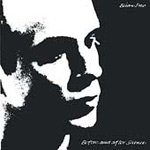From his work ‘treating’ the sounds of his band mates in Roxy Music onwards, Brian Eno has made a career of challenging the notion that musician is synonymous with instrumentalist, and nowhere in his discography is this challenge more explicitly stated than in his 1977 LP Before and After Science. Not an instrumental virtuoso by any means, Eno is more regarded for his compositional techniques and mixing skills. Fittingly, the science in question is undoubtedly the science of audio recording - a field in which Eno possesses a Copernican level of mastery. The titular concept is manifest throughout the album. Its first half boasts complex arrangements and sonic textures that could only have been achieved after the advent of overdubbing, synthesizers, and the like, while the second half features simpler, relatively direct music that could have been created before the recording process became so technical. In 1977, this was something of a trend for Eno, as later that year, he and David Bowie would take a similar approach to track sequencing on Bowie's Low.
Although Science may sound more intellectually stimulating than fun, Eno manages to blend the conceptual rigor of his compositional techniques with an equally strong sense of playfulness. You'll be amused by lyrics like “the logistics and heuristics of the mystics” before marveling at Eno's ability to construct a narrative out of such strained rhymes. Likewise, “King's Lead Hat” is by far the catchiest track on the LP, even before realizing Eno is tipping his hat to the Talking Heads through the song's anagrammed title and martial rhythm. The album eventually winds down to a gentler pace, though the listener's interest never does. Instead, as things get quieter there is a better chance to appreciate the subtleties of Eno's songwriting. “By This River” boasts an achingly pretty melody, while “Spider and I” closes the album with a lyrical sensibility that recalls Syd Barrett's Pink Floyd.
Songwriting truly is the greatest strength of Before and After Science. When it comes to intellectualism, Eno can theorize about music and the artistic process as well as anyone, but he ensures that the cognitive aspect of his craft doesn't interfere with the music's ability to entertain. Sadly, Eno essentially abandoned lyricism and the concision of pop music for a while after Science, focusing instead on ambient music and production work for other artists. Although his other artistic pursuits have taken him on divergent paths, this album is not only one of the best albums in Eno's catalog, but of the 1970s as a whole.
